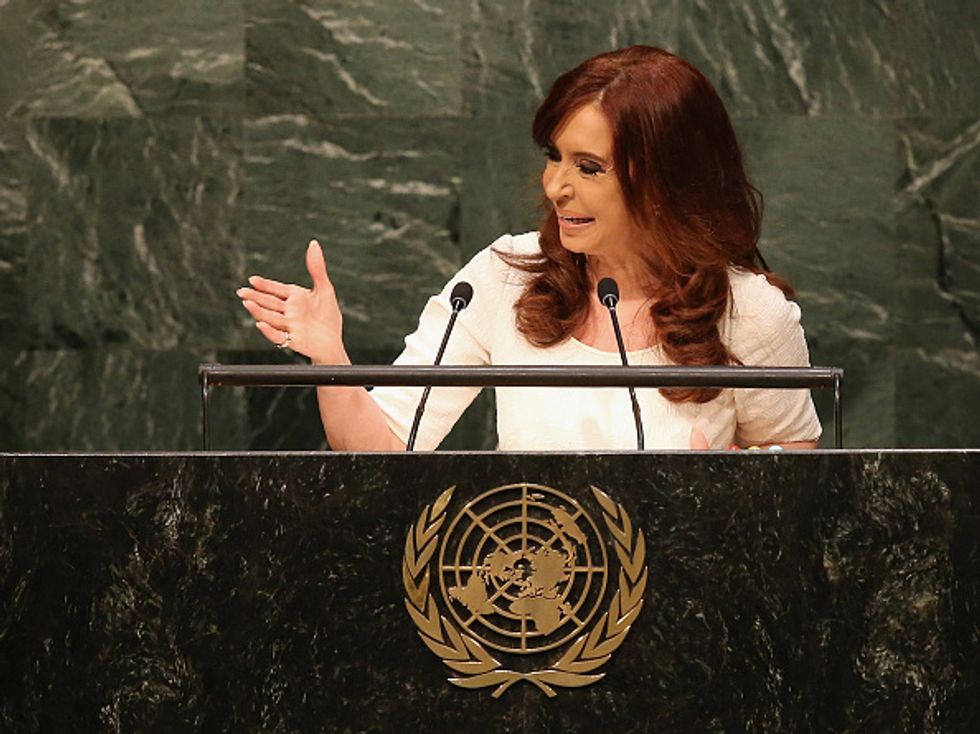Argentine President Cristina Fernandez de Kirchner claimed during the U.N. General Assembly on Monday that a former Obama administration official attempted to convince Argentina to “provide the Islamic Republic of Iran with nuclear fuel." The claim was seemingly overshadowed by President Barack Obama’s high-stakes dealings with Russian President Vladimir Putin.
The official at the center of Kirchner's claims confirmed his trip to Argentina in a statement to TheBlaze, but also provided vital context behind his objective and a proposed fuel swap deal that he said ultimately fell apart.
 NEW YORK, NY - SEPTEMBER 28: Argentine President Cristina Fernandez addresses the United Nations General Assembly on September 28, 2015 in New York City. World leaders gathered for the 70th session of the annual meeting. (Photo by John Moore/Getty Images)
NEW YORK, NY - SEPTEMBER 28: Argentine President Cristina Fernandez addresses the United Nations General Assembly on September 28, 2015 in New York City. World leaders gathered for the 70th session of the annual meeting. (Photo by John Moore/Getty Images)
Kirchner revealed Gary Samore, former White House Coordinator for Arms Control and Weapons of Mass Destruction, visited Argentina and suggested the nation provide Iran with nuclear fuel in 2010, two years into Obama’s presidency.
However, after the government in Argentina requested the fuel transfer request in writing, in keeping with protocol, Kirchner said the Minister of Foreign Affairs never heard from Samore again.
For full context, read her remarks via a transcript from the Argentine president’s official website:
In 2010 we were visited in Argentina by Gary Samore, at that time the White House’s top advisor in nuclear issues. He came to see us in Argentina with a mission, with an objective: under the control of IAEA, the international organization in the field of weapons control and nuclear regulation, Argentina had supplied in the year 1987, during the first democratic government, the nuclear fuel for the reactor known as “Teheran”. Gary Samore had explained to our Minister of Foreign Affairs, Héctor Timerman, that negotiations were underway for the Islamic Republic of Iran to cease with its uranium enrichment activities or to do it to a lesser extent but Iran claimed that it needed to enrich this Teheran nuclear reactor and this was hindering negotiations. They came to ask us, Argentines, to provide the Islamic Republic of Iran with nuclear fuel. Rohani was not in office yet. It was Ahmadinejad’s administration and negotiations had already started.
The allegations come at a time when the Obama administration is still under heavy scrutiny over its nuclear deal with Iran, which critics say puts the national security of the U.S. and Israel at risk.
Following the publication of this article, Samore provided a statement to TheBlaze outlining a past proposed nuclear deal that involved nations manufacturing "fresh fuel for the Tehran Research Reactor in exchange for Iran shipping most of its stockpile of low enriched uranium to Russia." Read his statement in full below:
“Story is true that I went to Buenos Aires in August 2009 to ask Foreign Minister Timmerman if Argentina would be willing to manufacture fresh fuel for the Tehran Research Reactor in exchange for Iran shipping most of its stockpile of low enriched uranium to Russia.
As I recall, Minister Timmerman told me that Argentina could not participate in the project because of Iran’s refusal to cooperate in the AMIA investigation. I said that I understood the political sensitivities and accepted that Argentina could not be part of the project.
We subsequently approached France, which agreed to manufacture the fuel for the Tehran Research Reactor.
In October 2009, Iran agreed to the deal: Iran would ship 1,200 kilograms of low enriched uranium hexafluoride (less than 5%) to Russia; Russia would further enrich the uranium to 19.5% and ship it to France for fabrication into research reactor fuel, which would then be shipped to Iran.
From Washington’s standpoint, the objective of the agreement was to remove most of Iran’s low enriched uranium stockpile at that time and therefore make it more difficult for Iran to produce weapons grade enriched uranium.
In the end, Supreme Leader Khameini rejected the Tehran Research Reactor agreement and the deal fell through. Iran’s rejection of the deal lead directly to President Obama deciding to increase economic and political pressure on Tehran, which produced UNSC Resolution 1929 in June 2010.”
TheBlaze is actively reaching out to the White House for comment.
---
Editor's note: The translation of Argentine President Cristina Fernandez de Kirchner's remarks included in this story was published by Mediaite, but a translation using Google translate returns an almost identical result.
This story has been updated.

 NEW YORK, NY - SEPTEMBER 28: Argentine President Cristina Fernandez addresses the United Nations General Assembly on September 28, 2015 in New York City. World leaders gathered for the 70th session of the annual meeting. (Photo by John Moore/Getty Images)
NEW YORK, NY - SEPTEMBER 28: Argentine President Cristina Fernandez addresses the United Nations General Assembly on September 28, 2015 in New York City. World leaders gathered for the 70th session of the annual meeting. (Photo by John Moore/Getty Images)


